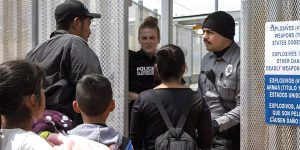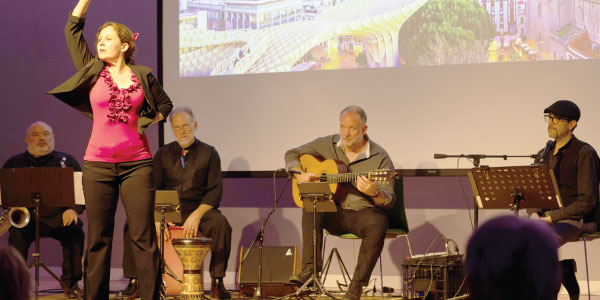
By Jorge Ramos
There are times when you can’t hesitate to act. Nicaragua is going through one of those times, having arrived at a turning point that could change everything. And at the center of it all is a young man of 20.
His story in a moment. Before that, the crime. Recent protests against President Daniel Ortega’s regime in Nicaragua, now having entered their second month, took many people in the country by surprise. For many years, Ortega and his wife and vice president, Rosario Murillo, have run their country to the benefit of business interests and the Catholic Church. Little was accomplished in Nicaragua without their approval. Eventually, Daniel and Rosario (that’s how they’re referred to in Nicaragua, by their first names) turned into a version of the Somozas, the tyrannical dynasty they helped overthrow decades ago in a revolution.
This became exceptionally clear earlier this year when the regime made a terrible miscalculation. In mid-April, Ortega approved a series of reforms for the country’s social security system. These reforms were strongly opposed by the people, and when protesters took to the streets, they were met with violent repression by the regime. Many protesters were killed.
Since then, Ortega and Murillo have shed any pretense of legitimacy. Nicaraguans realized that they weren’t only facing down a couple of autocrats, but that their leaders had no problem authorizing the shooting of young protesters. This changed everything. Now, protesters are focused not just on reversing reforms. They’re focused on ousting the Ortega regime entirely, and unrest has continued.
In an effort to quell the violence, roundtable discussions have been set up between the government and the protesters. That’s where Lesther Alemán comes into the picture. Alemán is a college student with an impressive announcerlike voice. Opposition groups, largely made up of students and business owners (who are turning their backs on the regime in growing numbers), chose Alemán as their spokesman. “It was a real challenge,” Alemán told me in a recent interview on Facebook. “I had never spoken on camera or in a press conference before … I had no idea what the consequences would be.”
And there have indeed been consequences. At a recent roundtable with Ortega, Alemán addressed him directly: “We are the ones being killed, being kidnapped and disappearing. This is not a dialogue. This is a negotiating table for your departure, and you know that very well, because the people have demanded it.”
Nobody had dared tell Ortega in public what many Nicaraguans have been whispering in private lately. Ortega has ruled Nicaragua for 23 years, from 1979 to 1990, and from 2006 until today. His supporters say that protesters are trying to conduct a coup. But Alemán disagrees.
“We aren’t attempting a coup,” he told me. “We have no militia, nor are we involved with guerrillas or backed by a political party. What we have tried to do here in Nicaragua is bring back the dream of being a republic again. Democracy has been kidnapped for more than 12 years.”
More than 160 people have been killed so far in recent unrest in Nicaragua, but the protests have not ceased. A nationwide strike has been called, and people are blocking city streets to prevent police from passing by. The country, it seems, is against the Ortega regime.
“It’s our dream, and I can see it coming true: Daniel Ortega will relinquish power,” Alemán told me. “I can see the president relinquishing power. I am convinced. The only power he has comes from the military.”
Alemán told me that since his confrontation with Ortega, he’s been staying at a safe house somewhere in the countryside. “I fear for my family and my life,” he told me. “Fear is a given.” (You can watch the interview in Spanish here: youtu.be/p56PXZtrtpA.)
The impossible can happen in Nicaragua. I know this because I’ve seen it. I was in the capital, Managua, in 1990, when Ortega’s Sandinistas lost the presidential election to Violeta Barrios de Chamorro. Back then, few people believed that it could happen, but it did. The same story could soon be repeated.
Sooner or later, Nicaraguans tend to get rid of their dictators.
___________________________________________________________________________________________
Nicaragua: Llegó el Momento
Hay momentos en que no se puede dudar. Ni fallar. Y en Nicaragua acaba de ocurrir uno de esos momentos que se convierten en símbolo y que lo cambian todo. El protagonista es un joven de apenas 20 años de edad. Su increíble historia en un momento.
Pero antes, el crimen. Las protestas contra el régimen del presidente Daniel Ortega en Nicaragua, hace más de dos meses, tomaron a muchos por sorpresa. Durante años Ortega y su esposa, la vicepresidenta Rosario Murillo, habían tenido un romance muy abierto con la iglesia católica y con los empresarios. Y casi nada en Nicaragua se movía sin su aprobación. Daniel y Rosario — en Nicaragua les llaman por su primer nombre — se estaban convirtiendo en los mismos tiranos que ellos ayudaron a derrocar. Primero fueron los Somoza; ahora eran los Ortega.
Pero luego cometieron un gravísimo error de cálculo. A mediados de abril propusieron un cambio al seguro social que fue recibido con fuertes protestas. La represión a esas protestas fue brutal y hubo varios muertos. Ahí los Ortega perdieron cualquier pretensión de legitimidad. Ya no se trataba, únicamente, de unos gobernantes autoritarios, sino de líderes que ordenaron, autorizaron o permitieron la muerte de muchos jóvenes. Eso lo cambió todo.
La lucha se transformó. El nuevo objetivo era sacar a los Ortega del poder.
Se llamaron a unas mesas de diálogo — entre el gobierno y la oposición — y es ahí donde Lesther Alemán apareció. Alemán es un estudiante universitario, en proceso de graduarse, que tiene una imponente voz de locutor. Los estudiantes y empresarios (que ya le estaban dando la espalda al régimen) lo escogieron a él para hablar. “Sentí un reto total”, me dijo Alemán en una entrevista. “Nunca había hablado en cámara o en una conferencia de prensa. … No me imaginaba cómo iba a repercutir”.
Y repercutió. Alemán se paró, tomó el micrófono y le dijo lo siguiente a Ortega, en su cara: “Nosotros hemos puesto los muertos, los desaparecidos, los que están secuestrados. Esta no es una mesa de diálogo. Es una mesa para negociar su salida. Y lo sabe muy bien. Porque el pueblo es lo que ha solicitado”.
Nunca, nadie, se había atrevido a decirle a Ortega en público lo que muchos nicaragüenses murmuraban en privado. Ortega lleva 23 años al frente del país: primero de 1979 a 1990, y luego del 2006 a la fecha. Los orteguistas dicen que este es un intento de golpe de estado. Alemán no está de acuerdo.
“No somos golpistas”, me dijo. “No tenemos a nuestro favor grupos paramilitares. Tampoco estamos involucrados en guerrillas, ni nos administra un partido político. Lo que hemos querido construir aquí en Nicaragua es el sueño de volverle al país el sentimiento de república. La democracia ha sido secuestrada hace más de 12 años”.
Siguiendo el libro de texto de Venezuela, el régimen de los Ortega ha reprimido sangrientamente a los estudiantes con la esperanza de que el miedo se cuele en las casas y las familias no permitan salir a sus hijos. Más de 160 personas han muerto hasta el momento. Pero las protestas no han parado. Se llamó a un paro nacional y hay calles bloqueadas para impedir el paso de la policía. El país se le ha volteado a los Ortega.
“Es nuestro sueño, y lo veo cumplirse: Daniel Ortega deja el poder”, me comentó Alemán sin mostrar ninguna duda. “Sí podría ver al Presidente abandonando el poder. Estoy convencido. Ellos no tienen más poder que los paramilitares”.
El de Ortega es el poder de las balas. Y del miedo. “Yo estoy en una casa de seguridad”, me dijo Alemán, escondido en algún lugar de Nicaragua, durante nuestra entrevista vía Facebook. “Lo que más temo es por mi familia, y también por mi vida. El miedo está”. (Aquí está la entrevista: youtu.be/p56PXZtrtpA.)
En Nicaragua suelen pasar cosas imposibles. Me consta. Estuve en Managua el día que los sandinistas perdieron las elecciones frente a Violeta Barrios de Chamorro en 1990. Pocos lo creían factible y, sin embargo, ocurrió. Esta vez la historia se puede repetir.
Si algo nos han enseñado los nicaragüenses es que, tarde o temprano, por las buenas o por las malas, se deshacen de sus dictadores.









